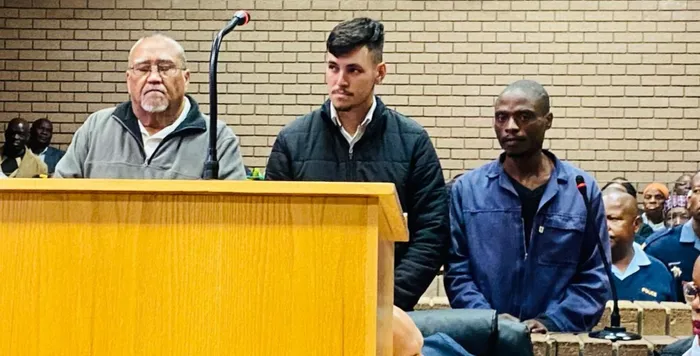
Zachariah Johannes Olivier, Rudolph de Wet and William Musora face charges of murder after the bodies of two women were left in a pigsty on a Limpopo farm. The US raised the case as an instance of extrajudicial killing.
Image: NPA
WE HAVE all been fixated by the recent exchange between Pretoria and Washington following the US State Department's report on human rights in South Africa and our government's rejection of the report as "inaccurate and deeply flawed". This is more than just a diplomatic spat; it has significant economic implications.
It may be served as a form of retribution for the SA governments, Israel and the ICJ stance. The US claims include a "significantly worsened" human rights situation, citing issues from land expropriation without compensation targeting Afrikaners, arbitrary detention, extrajudicial killings, and repression of racial minorities.
In a decidedly blunt rejoinder the Department of International Relations and Cooperation (Dirco) dismissed the report as "inaccurate and deeply flawed", accusing it of relying on "context-free information and unreliable accounts" and distortions - especially concerning incidents still before independent judicial processes.
Dirco points to the transparent and contested nature of the law, framed within constitutional mechanisms and robust judicial oversight. Indeed, expropriation, including without compensation, is not unprecedented in constitutional democracies when tied to public interest objectives and subject to due process. The US also raised the Limpopo “pig farm” case as an instance of extrajudicial killing, where two female farmworkers were allegedly murdered and fed to pigs, Dirco labels this as misrepresentation.
The matter is “actively adjudicated” by independent courts, and governmental structures diligently pursue proper investigation. These observations highlight tension between extrinsic perceptions and internal legal due process. In assessing human rights conditions, global observers must afford deference to domestic institutions when they demonstrably function coherently and transparently.
From an economic standpoint, land reform remains both a moral and fiscal imperative in SA, one that seeks to rectify historical injustices while fostering agrarian productivity and broad-based participation. Blanket condemnation of expropriation laws, without acknowledging their redistributive motivations, risks entrenching inequality and inhibiting economic transformation. SA’s pursuit of redress must not be misconstrued as an affront to minority rights when carried out via legal and accountable channels.
The SA government's rebuttal, as articulated by the Ministry of International Relations and Cooperation, challenges the very credibility of the US report. It highlights a reliance on "a-contextual information" and discredited accounts, and points to the irony of a nation that has exited the UN Human Rights Council critiquing another's record. This counter-narrative is crucial for SA as it seeks to maintain its economic relationships.
By framing the report as politically motivated and factually baseless, the SA government is attempting to mitigate its international reputation. We ultimately want to preserve the trade agreement and attract capital. From an economic perspective, property rights are the cornerstone of a stable investment climate. The perception, real or manufactured, that property rights are at risk can deter foreign direct investment and create domestic capital flight. It signals a heightened level of political and regulatory risk, which local and international investors are highly sensitive to.
The economic fallout of this diplomatic friction could first impact the risk assessments of international rating agencies, potentially leading to a further downgrade of SA's sovereign debt, resulting in increased borrowing costs for both the government and private sector, stifling growth. Secondly, the "extrajudicial killings" and "repression" narrative can tarnish the brand SA, impacting tourism and the willingness of multinational corporations to establish a presence or remain in SA.
The SA criticism of the US, comparing the Biden administration’s more inclusive human rights approach, was supplanted by the current US right-leaning approach. The irony of receiving judgment from a country that has withdrawn from the UN Human Rights Council. SA government could argue that if human rights advocacy is to retain credibility, it must transcend partisan biases and engage fairly and consistently with the US own processes.
In light of this controversy, the following is proposed:
- Multilateral verification: SA should invite independent international bodies - preferably UN-mandated institutions - to objectively assess the contested claims, including land policy execution and farm-attack data.
- Strengthen communication: Dirco and SA’s legal and statistical bodies should proactively disseminate accurate, evidence-based reports to domestic and international audiences, promoting transparency.
- Diplomatic engagement: SA should use diplomatic channels to engage with US counterparts, emphasising shared interests and discouraging unilateral politicisation of human rights narratives.
- Institutional dialogue: Regional bodies (AU, SADC) and legal peer platforms should reaffirm adherence to due process and mutual respect for sovereign reforms enacted under constitutional frameworks.
Ultimately, this is a battle of perception. The US report and SA's response are not just about human rights but about international influence and the economic levers that come with it. For SA, the challenge is to demonstrate, through action and not just words, that its constitutional democracy is robust and that its commitment to the rule of law and property rights remains unwavering. The economic future of the nation may depend on it.

Advocate Lavan Gopaul
Image: File
Advocate Lavan Gopaul is the director of Merchant Afrika.
** The views expressed do not necessarily reflect the views of IOL or Independent Media.
Related Topics: